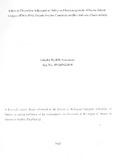| dc.description.abstract | Malaria as a disease is a major cause of human death in tropical countries. More than 300 million clinical cases with between one and three million deaths per year are attributed to malaria. Efforts to control this disease are by treatment of infected persons as well as physical or chemical strategies to control the mosquito vector. A safe and effective blood stage malaria vaccine could be a novel weapon in ameliorating the impact of malaria in endemic areas and reinforce hope for malaria eradication. Despite the identification of a number of candidate Plasmodium falciparum antigens, serine repeat antigen (SERA) being one such promising target antigen. The realization of an effective vaccine has been complicated due to lack of an appropriate adjuvant for human use.
This study evaluated the effect of chemokine adjuvants CCL5 and CCL20 on tolerability, safety, immunogenicity of SERA DNA malaria vaccine constructs and cross protective efficacy against Plasmodium knowlesi H strain in the olive baboon (Papio anubis) model of malaria. Nine male malaria naive olive baboons were randomly allocated into three experimental groups of three animals each depending on vaccine regimens (SERA+CCL5 in pIRES, SERA+CCL20 in pIRES and pIRES vector backbone alone).
All baboons were immunized. intramuscularly with a total medium dose of l mg/ml of respective vaccines at 0-, 28-, and 56-days schedule. On day 84 all baboons were challenged with P knowlesi H strain blood stage parasites to determine vaccine cross protective efficacy. There were no abnormal changes in animal health status, haematological, kidney and liver function parameters.
Immunization site local reactogenicity did not show any vaccine related adverse reactions. Analysis of cellular responses showed that the vaccines were immunogenic with a significant increase in T cell responses. Humoral immune responses showed an increase in anti SERA5 IgG titres throughout the vaccination phase. All experimental baboons developed patent parasitaemia showing that there was no vaccine efficacy as measured by delay in time to parasitaemia and development of clinical malaria disease. SERA DNA vaccine constructs co-expressed with either CCL5 or CCL20 as chemokine adjuvants are safe, well tolerated, and immunogenic with no vaccine related serious adverse events in olive baboons. However, the vaccine did not show cross protection efficacy against P knowlesi in vivo.
The current research results provide an initial preclinical validation of CCL5 and CCL20 as immunomodulatory chemokine adjuvants for malaria blood stage vaccines. In addition, provide validated preclinical evidence that the olive baboon can be utilised as an experimental model for evaluating safety and immunogenicity of malaria blood stage vaccines. | en_US |

